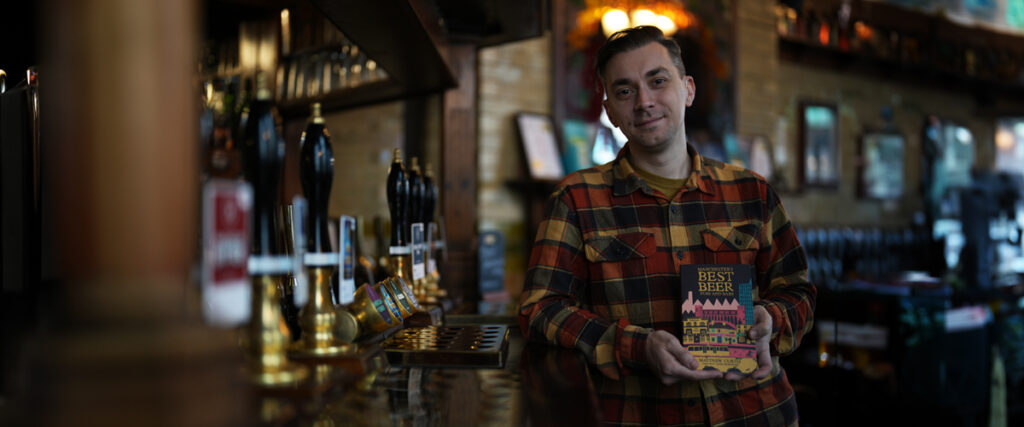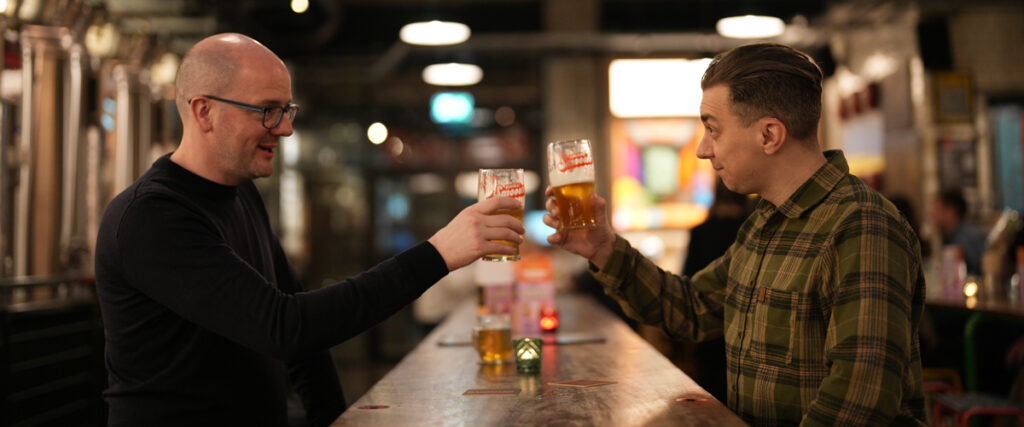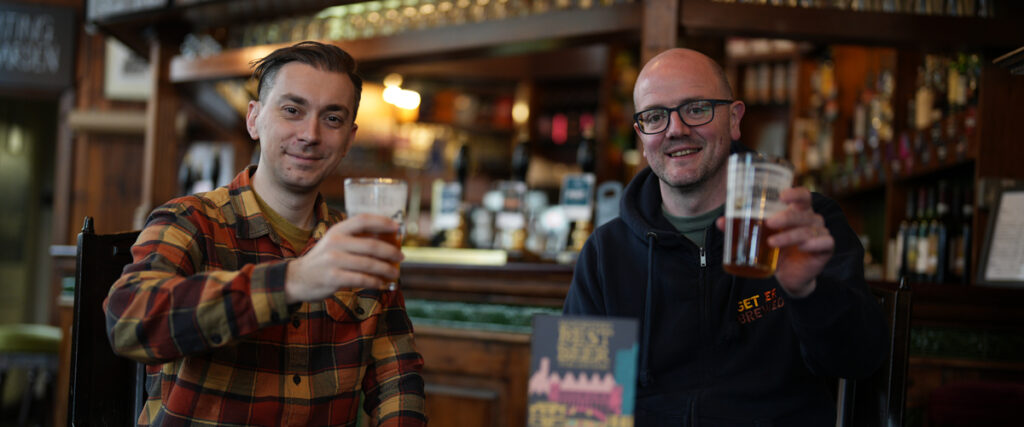The Biggest Lessons I Learned from Writing a Book About Beer In Manchester, Part One: The Family Brewers

There’s a family-owned freehouse near where I now live in Stockport, at the southeastern tip of Greater Manchester, called The Magnet. It is a very special, dare I say one-of-a-kind pub. A multi-roomed, quixotically decorated interior awaits travellers willing to jump on a 192 bus, or braver still, walk up the hill leading from Stockport station for all of 10 minutes. Either way, you’ll have worked up a thirst by the time you arrive, so you’ll be glad to know it offers no less than 14 beers on cask, and 12 on keg.
Permanent beers include Track Sonoma, RedWillow Weightless, Salopian Oracle and Deya Steady Rolling Man, while the rest of the taps feature an ever-changing selection of guests. Turnover is fast, so the beer is always fresh and in exceptional condition. A huge beer garden awaits those who arrive on one of the North West’s rare sunny days. Reading back through these many perks it’s no wonder National Geographic recently named it as one of the best pubs in the UK.
The pub simply had to go in my latest book Manchester’s Best Beer Pubs and Bars. No exceptions. But its inclusion completely changed the scale and scope of the project; if I was going to give credence to this pub in particular, then I would have to bestow the same level of respect on every corner of Greater Manchester (or at least until I hit my word count.) If you travel around the fringes of the metropolitan area, more exceptional pubs just like the Magnet can be found in abundance. There’s the Buffet Bar in Stalybridge station for starters, The Baum in Rochdale, and The Swan and Railway Hotel in Wigan (which serves an exceptional pint of Bass, as it happens.) And these are just a few of the jewels contained within a positively gleaming crown.
From thinking I might have landed myself a relatively simple job, I soon found myself in a predicament. For months I was lost in tab after tab of pinned Google maps and spreadsheets as I tried as best I could to whittle down the selection into something both coherent and useful. But the more I travelled around the city, the more pubs I discovered in its various neighbourhoods and boroughs.
The ones that surprised me the most, however, were those that belong to Greater Manchester’s four family breweries: Holt’s, Hydes, Robinsons, and J.W. Lees.
I did a lot of my research on foot. When I had a day free to explore potential pubs I would plan a route, take public transport to its start, and where possible walk from stop to stop. I’d often cover up to ten miles in a single day between seven or eight different stops, convincing myself en route it was a good way to burn off all the beer I’d been trying.
One particular day started not long after I’d just moved house from South Manchester to Stockport (pro tip: don’t try to write a book and move house at the same time, it’s not good for one’s sanity.) I noted that there was a pub near my new home run by Hydes called The Nursery Inn, and that – quite interestingly – like a handful of Manchester pubs it has it’s very own bowling green. Deep in finalising the last few pubs to include in the guide, I diligently planned a visit to investigate its potential.

Originally founded in 1863 in the borough of Moss Side, today Hydes brews at its current home in Salford, and owns just upwards of 50 pubs. The Nursery is perhaps one of the best examples of how good they are at running what you might call “proper pubs.” Hidden away on the back streets of the borough of Heaton Norris, finding the Nursery feels like you’ve left the city behind, and stumbled upon some vast countryside pub. On this stop I enjoyed a pint of its cask golden ale, Hopster, a rambunctiously bitter and citrusy beer that straddles the line between modern and traditional. I’m pleased to say I’ve been back to this particular pub many times since I did this important piece of research.
Next on my trail was East Didsbury, and another Hydes pub called the Fletcher Moss. On my walk over, however, I passed another idyllic looking pub called The Crown, which had clearly seen a recent renovation, and its freshly whitewashed walls were gleaming in the sunshine. I was pulled inside based on appearances alone and found that this pub belonged to the Robinsons estate. This 6th generation-owned Stockport brewery has been going since 1838, and has around 260 pubs dotted around the North West and North Wales. Here I enjoyed a pint of its flagship Unicorn Bitter, perhaps best described as beer-flavoured-beer. Proper. Although I confess this particular pub never made it into the final draft of the guide because I ran out of room. Although some exceptional Robinson’s pubs, such as The Arden Arms in Stockport town centre certainly did (and The Crown will almost certainly feature in the second edition.)
Continuing my trek, I was waylaid once more just a few metres down the street by another beautiful looking pub called The Griffin Hotel. This building was the polar opposite of The Crown; luscious red brick and stained glass, and once again I heard a voice urging me to pop inside. I found more eye candy within, in the form of mosaic tiled floors and a hand-carved wooden bar, plus another delicious pint of very bitter Bitter from Holt’s, whom I discovered have had this pub in its care since 1921. The brewery itself was founded in 1849, and still brews out of its historic site in North Manchester’s Cheetham Hill, from where it supplies its 127, mostly-Manchester-based public houses.
I did make it to Didsbury eventually, and ticked off some more pubs for the guide. But the ones I had just visited, evidently cared for a great deal by Manchester’s oldest surviving beer custodians, had given me a fresh perspective on the importance of the breweries that own them, and how influential they’ve been within the city’s beer culture. Case in point, it’s very difficult to find a poorly kept pint of cask beer in Manchester. I’m not saying they don’t exist, but if you consider the influence of the four family brewers on beer quality, and running good pubs, then it makes sense that knowledge and experience has filtered down over the decades, ensuring that the city, as a whole, takes pride in consistently high beer quality.
While I didn’t complete the family set and visit one of the 150 pubs owned by J.W. Lees on that particular day, very recently I got to spend a day at the brewery itself, along with some of the team from Get ‘Er Brewed. The Greengate Brewery was constructed in the town of Middleton in 1828 when the land was purchased by retired cotton manufacturer John Lees. The brewery took its current name when his grandson, John Willie Lees, took over operations in 1876.
Today the brewery is owned and operated by William, Simon, Christina, Anna and Michael Lees-Jones, its sixth generation custodians (and it looks likely that the 7th is not far behind joining them.) William and Michael kindly took some time out of their day to show us around the brewery itself, along with brewer Matthew Tiplady, who heads the brewery’s small batch project, known as The Boilerhouse.

What’s fascinating when you visit a genuine legacy brewery such as this, or to name another example Harvey’s in Lewes, Sussex, is how much care goes into each part of the production process. Whether it’s sourcing the best possible ingredients, refining processes in the brewery, or ensuring the beer is cellared so it pours in tip-top condition, there’s genuine love and real skill at every stage. You could easily argue that the UKs true ‘craft’ brewers are actually its longest surviving members such as these.
J.W. Lees isn’t completely rooted in its history, either, recently revamping one of its central Manchester venues and transforming it into what they’ve called ‘The Founders Hall’. As a pub it provides the perfect opportunity to try its beers in a more contemporary setting than some of its more traditional pubs. Whether it’s a classic pint of Bitter, or one of the newer creations from the Boilerhouse, such as its recently released Munich Helles, there’s plenty here to keep beer lovers of all shapes and sizes satisfied.
It’s this rich variety offered that forms the cornerstone of the family brewers influence on Manchester’s beer culture, and what gives the scene as a whole such phenomenal depth. You literally can’t visit another city or town in the UK and experience a beer community like it, as it doesn’t exist anywhere else in the country. Our offering of four surviving family brewers is unique. Yes, Manchester has a phenomenal modern beer culture, and I’ll be covering that in my next blog post. But we wouldn’t have what we can offer now, without the experience, knowledge and care of those who came before.
Manchester’s Best Beer Pubs and Bars is available now, and can be ordered here. If you’d like to know more about the book, watch our interview with Matthew here.